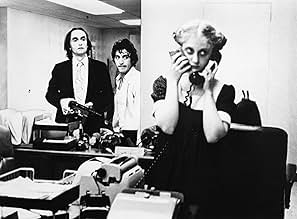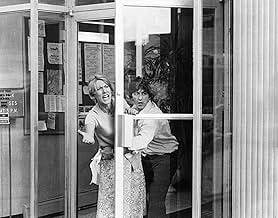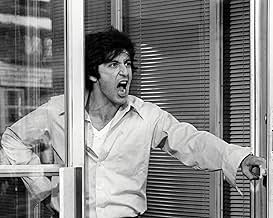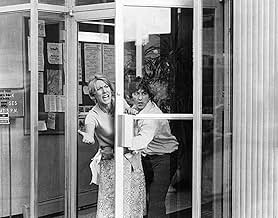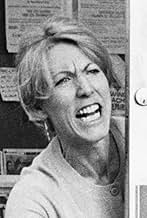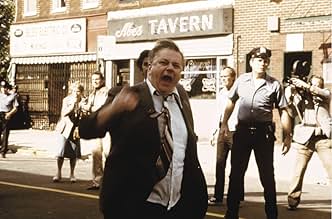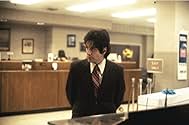Un hombre intenta robar un banco para pagar por la operación de su amante, que acaba en una situación con rehenes rodeada de medios de comunicación.Un hombre intenta robar un banco para pagar por la operación de su amante, que acaba en una situación con rehenes rodeada de medios de comunicación.Un hombre intenta robar un banco para pagar por la operación de su amante, que acaba en una situación con rehenes rodeada de medios de comunicación.
- Dirección
- Guión
- Reparto principal
- Ganó 1 premio Óscar
- 14 premios y 20 nominaciones en total
Resumen
Reviewers say 'Dog Day Afternoon' is celebrated for Al Pacino's compelling performance and Sidney Lumet's direction. It explores themes like crime, media influence, and social issues. The film is praised for its realistic depiction, strong characters, and blend of drama and humor. However, some find it overly long and uneven. Despite mixed opinions on pacing and length, it is generally regarded as a significant work in American cinema, capturing the 1970s spirit.
Reseñas destacadas
By the time Sidney Lumet's "Dog Day Afternoon" came around he had already learned to let Al Pacino loose. Forget the holdbacks of "Serpico"; here we get a glimpse into the real Al, the actor who would bring Tony Montana to life in the years to come and the same man who provided Michael Corleone with such heartfelt warmth that was lacking in some of his lesser characters.
There's essentially the Al Pacino as an actor and the Al Pacino as a character, and here he's the character, and it works splendidly. Al Pacino the actor comes into play when he is given a recycled script and a talentless director, which has been happening a lot lately, although fortunately his comparison, De Niro, has been lucky enough to generally avoid these blunders of older-age film-making.
This is based on a true story, like "Serpico," only it's better and more involving. It connects with the audience more than "Serpico" because it doesn't jump through the same old hoops; it goes for the long trek and comes off better than it would have had the team behind it been lazy. The clichés are gone and the originality creeps in early on. Watch Pacino indulge himself in character and let the plot sink in. It's more touching than it seems at first.
Pacino is Sonny Wortzik, a Brooklyn man who takes a bank hostage in order to pay for his "wife's" operation. The wife is actually Leon Shermer (Chris Sarandon who was Oscar-nominated for this, his first role in a mainstream film), Sonny's gay lover who doesn't have the money for a sex operation.
The bank robbery was going to be what one of classic cinema's greatest bad guys once described as a quick "in and out," but Sonny gets held up inside the bank and soon he's all over the news and police are standing outside the building with guns drawn. It's like Denzel's movie only better and more original. Oh, and true. This one actually happened and we can tell.
Sonny's partner in crime, Sal (John Cazale), is worried that he'll be treated as a homosexual by the media outside. His fretting is comic relief and one of the connections between the film and the audience. Charles Durning is the frustrated cop handling the situation. His performance is as subtly convincing as Cavale's.
Pacino's performance is exceedingly excellent, manic and energetic. He'd display this same talent in "Scarface" again eight years later; only he would be bashed by the critics for going over-the-top. (Although they really just had problems with the excessive profanity and violence, just like Mel Gibson's "The Passion of the Christ" will soon become a well-known classic and people will laugh when they hear that someone once called it the most violent film ever made.)
There's also one of the best scenes of all time in this movie that rivals Montana's Last Stand in "Scarface" or the Baptism Scene in "The Godfather," which involves Sonny speaking on the phone to his "wife," carefully concealing his motive from any listeners nearby. Watch Pacino delve into character here and you're immediately hooked. We like his character because he seems real and Pacino makes him real, and that's why this will go down as one of the best tour de force performances of all time.
Is this Hollywood trying to ease our culture onto homosexuality and sex change operations? Is Hollywood trying to gradually introduce us to gay characters in the hope that the uptight American families will be increasingly invaded by the images of gay men? No. This is Hollywood showing us a true story, regardless of the homosexuality. Pacino could be playing a frustrated postal worker and it would still work because it all settles down to the fact that the suspense and dramatics of the movie affect us, not the background of its characters.
Sarandon's Oscar nomination was more than worthy; here he displays the smarmy talent that would shine through in his characters in the years to come. Prince Humperdink from "The Princess Bride" is equally memorable but less realistic. Here he seems more real, which is good for this film and would have been quite bad for "Bride." We don't like real characters in fantasy tales, do we?
Lumet, who ruined "Serpico" with his bad editing, out-of-place music, clichéd dialogue/events and unnecessary scenes, directs "Dog Day Afternoon" with style and flair and good pacing and a surprisingly heartfelt sense of emotion and care. This isn't exactly a good example of a perfect motion picture but it's pretty close.
There's essentially the Al Pacino as an actor and the Al Pacino as a character, and here he's the character, and it works splendidly. Al Pacino the actor comes into play when he is given a recycled script and a talentless director, which has been happening a lot lately, although fortunately his comparison, De Niro, has been lucky enough to generally avoid these blunders of older-age film-making.
This is based on a true story, like "Serpico," only it's better and more involving. It connects with the audience more than "Serpico" because it doesn't jump through the same old hoops; it goes for the long trek and comes off better than it would have had the team behind it been lazy. The clichés are gone and the originality creeps in early on. Watch Pacino indulge himself in character and let the plot sink in. It's more touching than it seems at first.
Pacino is Sonny Wortzik, a Brooklyn man who takes a bank hostage in order to pay for his "wife's" operation. The wife is actually Leon Shermer (Chris Sarandon who was Oscar-nominated for this, his first role in a mainstream film), Sonny's gay lover who doesn't have the money for a sex operation.
The bank robbery was going to be what one of classic cinema's greatest bad guys once described as a quick "in and out," but Sonny gets held up inside the bank and soon he's all over the news and police are standing outside the building with guns drawn. It's like Denzel's movie only better and more original. Oh, and true. This one actually happened and we can tell.
Sonny's partner in crime, Sal (John Cazale), is worried that he'll be treated as a homosexual by the media outside. His fretting is comic relief and one of the connections between the film and the audience. Charles Durning is the frustrated cop handling the situation. His performance is as subtly convincing as Cavale's.
Pacino's performance is exceedingly excellent, manic and energetic. He'd display this same talent in "Scarface" again eight years later; only he would be bashed by the critics for going over-the-top. (Although they really just had problems with the excessive profanity and violence, just like Mel Gibson's "The Passion of the Christ" will soon become a well-known classic and people will laugh when they hear that someone once called it the most violent film ever made.)
There's also one of the best scenes of all time in this movie that rivals Montana's Last Stand in "Scarface" or the Baptism Scene in "The Godfather," which involves Sonny speaking on the phone to his "wife," carefully concealing his motive from any listeners nearby. Watch Pacino delve into character here and you're immediately hooked. We like his character because he seems real and Pacino makes him real, and that's why this will go down as one of the best tour de force performances of all time.
Is this Hollywood trying to ease our culture onto homosexuality and sex change operations? Is Hollywood trying to gradually introduce us to gay characters in the hope that the uptight American families will be increasingly invaded by the images of gay men? No. This is Hollywood showing us a true story, regardless of the homosexuality. Pacino could be playing a frustrated postal worker and it would still work because it all settles down to the fact that the suspense and dramatics of the movie affect us, not the background of its characters.
Sarandon's Oscar nomination was more than worthy; here he displays the smarmy talent that would shine through in his characters in the years to come. Prince Humperdink from "The Princess Bride" is equally memorable but less realistic. Here he seems more real, which is good for this film and would have been quite bad for "Bride." We don't like real characters in fantasy tales, do we?
Lumet, who ruined "Serpico" with his bad editing, out-of-place music, clichéd dialogue/events and unnecessary scenes, directs "Dog Day Afternoon" with style and flair and good pacing and a surprisingly heartfelt sense of emotion and care. This isn't exactly a good example of a perfect motion picture but it's pretty close.
Personally, this is one of the most touching films I've seen.
The acting is superb, both Al Pacino and John Cazale deliver outstanding and memorable performances as the unexperienced bank robbers Sonny Wortzik and Sal.
I should highlight the late John Cazale's performance of Sal, a character that says more with his face than he does with dialogue. Perhaps the most realistic character ever portrayed on film.
Al Pacino as usual delivers a great performance as was nominated for an Academy Award playing the role of Sonny.
This is a very entertaining film, filled with humor, social issues and moral issues, definitely a must-watch.
The acting is superb, both Al Pacino and John Cazale deliver outstanding and memorable performances as the unexperienced bank robbers Sonny Wortzik and Sal.
I should highlight the late John Cazale's performance of Sal, a character that says more with his face than he does with dialogue. Perhaps the most realistic character ever portrayed on film.
Al Pacino as usual delivers a great performance as was nominated for an Academy Award playing the role of Sonny.
This is a very entertaining film, filled with humor, social issues and moral issues, definitely a must-watch.
I've watched this film for the third time in a few years last night. Instead of writing a straight review, I'd like to jot down ten thoughts just off the top of my head concerning this exquisite movie:
1) Watching this film will change forever your perception of the bank heist genre, making you question the contrived cinematic conventions these films usually make use of.
2) The source of this film's paradoxical and/or farcical elements spring from life itself, not from film or pre-existing cinematic conventions. Sometimes, the absurdities of life are so great, they dwarf those included in any form of fiction. Without even trying to make that point, this film captures that concept beautifully.
3) Its tone in relation to the homosexual theme is ahead of its time. In fact it's ahead of OUR time, even, in hardly making an issue out of it at all - it just IS.
4) It captures the climate of the 70s in a manner so sober, you'll remember its unshowy yet authentic feel forever.
5) Lumet's film brings to life the concept of the distorting lens of the media and how different groups with different agendas will turn an outlaw into a hero, with far more efficiency than Oliver Stone's brash, bloated, childish and repetitive Natural Born Killers.
6) Watching this film will illustrate to the younger generations exactly why Al Pacino has earned himself the legendary status he probably no longer would deserve with his performances of the last 10 years alone. **SPOILERS**: Just watch those last ten minutes of him handcuffed against the bonnet of a car, where he doesn't say a word, but speaks volumes with his eyes and his soul just oozing out of every frame at the end of the movie; you'll remember those eyes for as long as you live!
7) Watching this film, you'll realise that firing a gun-shot is a BIG DEAL in real life, and that other films make too much use of gun fire in a highly contrived way.
8) All that tension deriving from pointed guns unable to fire a shot OR move away you realise Tarantino must've taken notes sometime along the way.
9) No genre is old or done too many times before if it's handled with this amount of freshness, inspiration and talent.
10) Watching Dog Day Afternoon for the third time has filled me with the same amount of wonder at the power of truly inspired but unobtrusive film-making as it did first time round.
1) Watching this film will change forever your perception of the bank heist genre, making you question the contrived cinematic conventions these films usually make use of.
2) The source of this film's paradoxical and/or farcical elements spring from life itself, not from film or pre-existing cinematic conventions. Sometimes, the absurdities of life are so great, they dwarf those included in any form of fiction. Without even trying to make that point, this film captures that concept beautifully.
3) Its tone in relation to the homosexual theme is ahead of its time. In fact it's ahead of OUR time, even, in hardly making an issue out of it at all - it just IS.
4) It captures the climate of the 70s in a manner so sober, you'll remember its unshowy yet authentic feel forever.
5) Lumet's film brings to life the concept of the distorting lens of the media and how different groups with different agendas will turn an outlaw into a hero, with far more efficiency than Oliver Stone's brash, bloated, childish and repetitive Natural Born Killers.
6) Watching this film will illustrate to the younger generations exactly why Al Pacino has earned himself the legendary status he probably no longer would deserve with his performances of the last 10 years alone. **SPOILERS**: Just watch those last ten minutes of him handcuffed against the bonnet of a car, where he doesn't say a word, but speaks volumes with his eyes and his soul just oozing out of every frame at the end of the movie; you'll remember those eyes for as long as you live!
7) Watching this film, you'll realise that firing a gun-shot is a BIG DEAL in real life, and that other films make too much use of gun fire in a highly contrived way.
8) All that tension deriving from pointed guns unable to fire a shot OR move away you realise Tarantino must've taken notes sometime along the way.
9) No genre is old or done too many times before if it's handled with this amount of freshness, inspiration and talent.
10) Watching Dog Day Afternoon for the third time has filled me with the same amount of wonder at the power of truly inspired but unobtrusive film-making as it did first time round.
... which it does, in buckets. Founded on a very interesting true story, embellished by Al Pacino who turns it into gold, albeit not in the quantities his character would have hoped for. With a stonking supporting cast, non better than John Cazale, you'll be drawn into the events presented as if you were there on the day, or afternoon, and quite probably investigate further as the titles start to role. Without question one of the best films of the 70s and one of few that retains its progressive and powerful impact all these years later.
Al Pacino stars in this film based on the set of historical events that took place in Brooklyn, New York during the early seventies. Dog Day Afternoon retells the story of these events when Sonny and Sal decide to rob a bank in Brooklyn, but their efforts seem to have failed when they realize most of the money has already been collected for the day and soon the police have the entire bank surrounded. The remainder of the film reveals Sonny's interactions with his hostages, the large media crowd that has gathered, and Detective Moretti who attempts to negotiate with Sonny. I think Al Pacino is exquisite in his role, revealing the truly human personality of someone who decided to disobey the law. I found it impossible to not feel sorry for Sonny's character, as he brought realness and a true New York feel to his role. This film also showed how the media can take something and create an enormous spectacle of it, to the point that even the people in danger are caught in the televised web and forget their potential danger. If you want to see Al Pacino at his prime acting career, Dog Day Afternoon should be on your list.
¿Sabías que...?
- CuriosidadesAlthough he had initially agreed to play the part of Sonny, Al Pacino told Sidney Lumet near the start of production that he couldn't play it. Pacino had just completed production on El padrino parte II (1974) and was physically exhausted and depressed after the shoot. With his reliance on the Method, Pacino didn't relish the thought of working himself up to a state of near hysteria every day. Lumet unhappily accepted the actor's decision and dispatched the script to Dustin Hoffman. Pacino reportedly changed his mind when he heard that his rival was being considered for the role.
- PifiasIn 1972, NYC police squad cars were dark green and white, not blue and white which debuted about two years later.
- Créditos adicionalesOpening credits prologue: What you are about to see is true - It happened in Brooklyn, New York on August 22, 1972.
- Versiones alternativasThe 1997 DVD contained the opening 1984 Warner Bros. Pictures plaster and no closing logo.
- ConexionesFeatured in Lumet: Film Maker (1975)
Selecciones populares
Inicia sesión para calificar y añadir a tu lista para recibir recomendaciones personalizadas
Detalles
- Fecha de lanzamiento
- País de origen
- Sitios oficiales
- Idioma
- Títulos en diferentes países
- Tarda negra
- Localizaciones del rodaje
- Empresas productoras
- Ver más compañías en los créditos en IMDbPro
Taquilla
- Presupuesto
- 1.800.000 US$ (estimación)
- Recaudación en Estados Unidos y Canadá
- 50.000.000 US$
- Recaudación en todo el mundo
- 50.005.703 US$
Contribuir a esta página
Sugerir un cambio o añadir el contenido que falta

Principal laguna de datos
What is the streaming release date of Tarde de perros (1975) in India?
Responde



